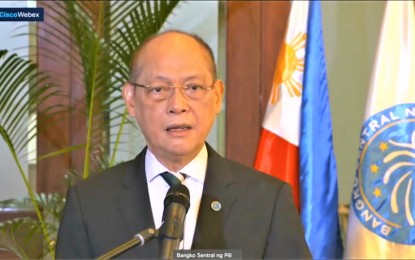
BSP Governor Benjamin Diokno
MANILA – Structural framework of agencies that are part of the fight against money laundering needs to be solid to maximize the benefits of continued amendments in the Philippines’ Anti-Money Laundering Act (AMLA), Bangko Sentral ng Pilipinas (BSP) Governor Benjamin Diokno said Thursday.
In a virtual briefing, Diokno said they lauded the latest amendment on AMLA, which now includes real estate developers and offshore gaming operators and their service providers as among the covered persons.
He said the latest amendments “strengthen the country’s legal framework to fight money laundering” and terrorist financing.
The other amendments in the AMLA include authorizing the Anti-Money Laundering Council (AMLC) to issue subpoena and investigate suspicious transactions and giving the Council additional power to “preserve, manage, or dispose asset pursuant to a freeze order, preservation order, or judgement of forfeiture.”
While the measures are seen to address the gap in the AMLA, Dioko, who is the AMLC chairman being the central bank governor, also cited the need to ensure that the structural framework of implementing agencies are intact.
“It is also equally important to ensure that structural framework in the respective implementing agencies are well-developed to achieve effective implementation of the law to fight and prevent money laundering, terrorism and terrorist financing cases,” he said.
The latest AMLA amendments, listed under Republic Act (RA) No. 11521, were signed into law by President Rodrigo R. Duterte on Jan. 29, 2021, a few days before February or the end of the observation period set by the Paris-based anti-money laundering watchdog Financial Action Task Force (FATF) on the country’s anti-money laundering and counter-terrorism financing (AML/CTF) measures.
Failure to prove the effective implementation of AML/CTF measures and address gaps in the law would result in Philippines’ inclusion in FATF’s gray list, which the country was able to graduate from in 2017 upon the enactment of Republic Act 10927 that included casinos as among the covered institutions of the AMLC. (PNA)
